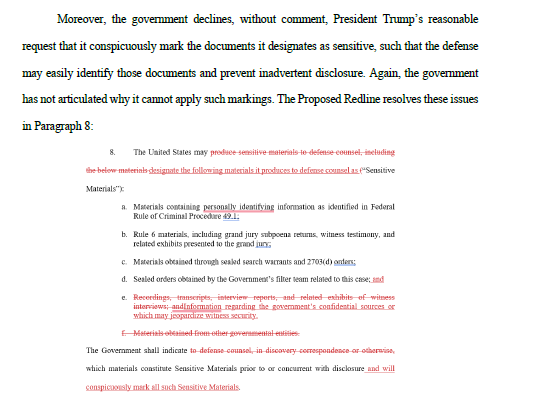The most important thing to know about Trump's opposition to the government's proposed protective order is this: He wants the freedom to disclose witness interviews, recordings, etc. conducted outside the grand jury. 1/ 

That would theoretically allow him to reveal the names and publish the statements of those who spoke to DOJ/the Special Counsel *outside the grand jury* and/or could be cooperating. 2/
Yes, Trump instead floats treating "information regarding the government's confidential sources or which may jeopardize witness security" as sensitive. But he wouldn't treat witness transcripts, recordings, & interview reports as automatically sensitive. Ask yourself why. 3/ 

By limiting protection to those materials that implicate "confidential sources" or would "jeopardize witness security," Trump would force the Special Counsel to first identify and then fight over which materials do and don't qualify for confidential treatment at this stage. 4/
At the very least, as one of my colleagues noted, that would create yet another mechanism to slow things down. And delay is always Trump's first rule of litigation. 5/
But it's more than timing. A protective order that allows Trump to reveal the identity of witnesses and discuss the substance of their statements outside the grand jury could 1) prejudice potential jurors; and 2) intimidate, if not endanger, some of the most helpful witnesses. 6/
Why? Because those with truly valuable truths to tell are usually not strangers to the government. Often, they will have proffered or met with the government before testifying before the grand jury; in other cases, they may never have even been called before a grand jury. 7/
Finally, even as to those documents Trump agrees are sensitive, he doesn't want to them under seal if and when he quotes them in briefs. Instead, he proposes including "Sensitive Materials in any public filing without Leave of Court if all sensitive information is redacted." 8/ 

But how, even after the government selectively marks certain materials as sensitive, as Trump proposes, is he supposed to know which portions are, in fact, sensitive? Or does he think that should be his call too? FIN.
• • •
Missing some Tweet in this thread? You can try to
force a refresh

 Read on Twitter
Read on Twitter





